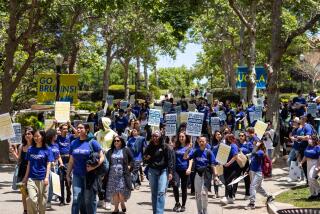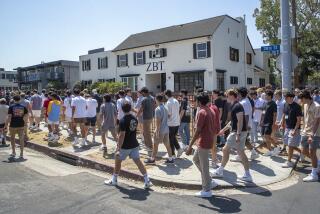CAMPUS CORRESPONDENCE : In Alabama, Political Power Mostly Begins in a Fraternity House
TUSCALOOSA, ALA. — This Tuesday, Americans can be assured that every vote will count equally. At the University of Alabama, there is no such assurance. Here, some votes count for a lot more than others, thanks to an secretive, underground political organization known as the “Machine.”
The Machine is a select coalition of 27 fraternities and sororities that make up only 20% of the 19,000-student university and yet completely dominates campus politics. That’s important in Alabama: Players in campus politics often graduate to roles in state government.
The Machine, known more formally as Theta Nu Epsilson, is said to shares roots with other clandestine groups such as Yale’s Skull and Bones. It has never publicly conceded its existence, but the organization has been a force in Alabama politics since the turn of the century. Indeed, a list of former Machine members reads like a Who’s Who of Alabama’s political elite. Few who have challenged the student organization have gone on to build successful careers in state politics. Former Gov. George C. Wallace is the most notable exception.
Democratic Sen. Lister Hill, who served in Washington for more than 40 years, was a Machine alumnus. So was former Sen. John Sparkman, who held office nearly as long. Richard C. Shelby, one of the state’s two current Democratic senators, is reputed to have been president of the Machine while at the university. Machine alumni also serve in Montgomery as state legislators and powerful appointees who control university funds.
But its political dominance begins on campus, where the Machine can count on the support of many faculty and administrators, who were members of the fraternities and sororities that make up the Machine. Potential operatives come from the ranks of freshmen and sophomores pledging at the “right” houses. Those chosen are trained while juniors. As seniors, these 27 students, one from each of the fraternities and sororities, are ready to govern campus life.
Students who are not members of the select fraternities and sororities--the vast majority--exhibit little interest in campus political life and student government. Voter turnout for the most recent campus election was around 15%. When the university’s Office of Student Life recently formed a 12-member committee, composed of six students and six faculty, to recommend antidotes to apathy, the Machine succeeded in scuttling the reform efforts by placing loyalists on the panel.
The Machine’s tactics are seldom heavy-handed. The organization controls about 40 of the 50 student Senate seats. Its modus operandi is to “fix” things before they go public. The Machine achieves this by controlling key appointments to Student Government Assn. committees, moving to table (read: kill) unacceptable bills and measures, and knowing glances. When a Senate seat became vacant last month, for example, Machine-backed SGA President Mark Bain let it be known that he had already chosen the candidate, though the application deadline was four days away. Independents need not apply.
The Machine is also well-funded. Each of the 27 Machine-affiliated fraternities and sororities contribute $500 a year. The money largely bankrolls election campaigns for Machine members, sometimes paying for billboards and radio spots.
It should not come as a surprise, then, that the success record of students who try to frustrate the will of the Machine are usually not impressive. Two recent cases illustrate the point.
In 1989, Joey Viselli mounted an aggressive campaign for student-body president, but was narrowly defeated by the Machine-backed candidate. Following the election, the university’s Greek system suddenly began a boycott of his father’s pizza parlor, ultimately driving him into bankruptcy.
Two years later, the student newspaper, the Crimson White, published an article detailing the corruption of the Machine and naming many of its members. Nearly 5,000 copies of the newspaper were stolen from news racks on campus. They were subsequently found in a garbage dumpster behind a Machine-affiliated fraternity.
These kinds of shenanigans hardly inspire the average student to take an interest in the way student government is run on campus, even though the Student Government Assn. controls nearly $1 million in student-activity fees. Indeed, one of the first things Alabama students learn is that seeking a voice in the university’s political life isn’t worth the potential trouble. Unfortunately, it’s likely to remain that way, so tight is the Machine’s hold on the university.
More to Read
Sign up for Essential California
The most important California stories and recommendations in your inbox every morning.
You may occasionally receive promotional content from the Los Angeles Times.










